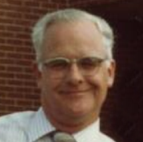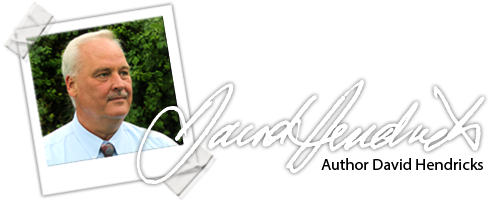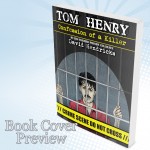 My father is in heaven. He died four years ago, shortly after turning 80. For his last 20 years, he was a traveling preacher, known in the Plymouth Brethren fellowship as a “laboring brother.” Because of him, our family gathers at Thanksgiving instead of at Christmas, because Christmas trees come from pagan worship, because Jesus wasn’t born in December, and because God would never approve of such blasphemies as drunken parties to honor the birth of His only Son. And so this week I’ll travel to my eldest sister’s house to join my family and to be thankful together and to visit and to squabble and to do everything at Thanksgiving time other families do at Christmas time.
My father is in heaven. He died four years ago, shortly after turning 80. For his last 20 years, he was a traveling preacher, known in the Plymouth Brethren fellowship as a “laboring brother.” Because of him, our family gathers at Thanksgiving instead of at Christmas, because Christmas trees come from pagan worship, because Jesus wasn’t born in December, and because God would never approve of such blasphemies as drunken parties to honor the birth of His only Son. And so this week I’ll travel to my eldest sister’s house to join my family and to be thankful together and to visit and to squabble and to do everything at Thanksgiving time other families do at Christmas time.
A few years ago, we were gathered in my sister’s living room in Southern Illinois, sated from a bountiful feast and engaging in another tradition. Each person read a scripture verse from a card placed before them and then said what they were thankful for. When my turn came I read, “In everything give thanks,” and then said, “I’m thankful Dad’s not here.” It got a big laugh. Not that we didn’t love our Dad. We did. But the statement was funny, not just because of the out-of-context jolt, but because it was true that Dad’s presence made us uncomfortable.
He was a stern man, lacking in the social graces you and I employ daily. I remember one Thanksgiving Dad was there. Three small candied yams remained in the serving bowl and two siblings were eyeing them hungrily. Dad addressed the heavier one, “Leave it for him. He can use it more than you.”
My mother said, “Chuck! Don’t say that!”
“Why not?”
“It hurts his feelings.”
“You want me to lie? He’s fat! I’m just being honest.”
My father was naturally short on tact. A co-worker told me a story from Shure Brothers, where my father was a quality control manager. One day she overheard an employee saying, “Chuck’s smiling. They must have rejected a batch.” My father himself recounted to me a time when he, a fervent young believer, was counseled by an older “brother”: “The Bible tells us to season our speech with salt, Chuck. I believe you’ve been using pepper.”
My father’s mission was to evangelize; in church, at work, and even in the home. My mother made the world’s tastiest spaghetti—no Italian ever did it better—and when an invitation was extended, everyone knew it meant Laverne would make spaghetti. Invited guests would have a decision to make: was her spaghetti worth the post-prandial preaching? I guess the people I got to know best must have loved spaghetti.
Nor were we spared because we were his children. Daily Bible readings were held in our home. To make it less tedious, Dad instituted a contest. It would be my turn to read until I made a mistake. My sister would pounce on my error and then she’d get to read until she flubbed a word, and so on. This Thanksgiving, if you were to come home with me and say the phrase, “brief synopsis of Revelation,” you’d hear a collective groan as we’d all remember one summer when Dad announced that’s what we were going to get. “It’ll take me a week or so to run through it,” he said, but it dragged on for one interminable year of squirming torture.
And yet at Dad’s funeral, I learned something I’d never realized before. Lots of people loved this hard, unbending man. They came from all over—six states, two countries. The preacher didn’t deliver a eulogy; he preached the gospel. And he hit it hard. Hellfire and damnation—and God’s saving grace. Out of place? Not at Brother Chuck’s funeral, it wasn’t. It was exactly what he would have wanted.
At the graveside, a crowd of people gathered. Several stood by the casket and said a few words. They told stories of my dad and shed gentle tears as they lovingly remembered him. It wasn’t like they were ignorant of his flaws. One story highlighted his bluntness, and wisps of smiles rippled through the mourning congregation.
I wanted to say something too, but I didn’t. If I thought I could have done it without breaking down, here’s what I would have said.
I know my father loved me, but he wasn’t the kind of man to just say it. He spent time with his children. He played sports with us and he read to us for hours. But it was only after I’d become a father myself and after my family had been ripped from me and after I’d suffered so severely I doubted the very existence of the God my father knew and loved, that I came to understand how much he loved me.
My father, along with my mother, drove three hours each way to visit me every month all six years I was in prison. My father cried with me and he hurt for me, he prayed with me and he prayed for me, he begged God to dispel my doubt and to deliver me from my unjust predicament. It was clear he loved me. But it was the thing he didn’t do that, to me, proved my father’s love like nothing else could.
This man of God, who’d never avoided the chance to confront a stranger about Jesus, this husband who’d made a practice of ignoring signs of boredom, anger and hostility as he’d driven home his message of salvation to unwilling victims—so much so that my mother’s relatives would come to town and call her out, but they’d never again put themselves under my father’s roof—this father who desperately wanted to assure his son of the futility of anger against God and to show him from the scriptures that God never gives us a trial so great we can’t bear it … this hard, unyielding, insensitive, yes, even selfish man never once preached to me. He wanted to, I could see it, but he must have had some sense of the additional pain he’d pile on, and he never said a word. If that isn’t love, you tell me what is.
And so when it’s my turn at the dinner table this Thanksgiving, I plan to simply say, “I’m thankful for my Dad.”
Thank you for viewing my blog. Please return often. I value your comments.
Regards,
David Hendricks

